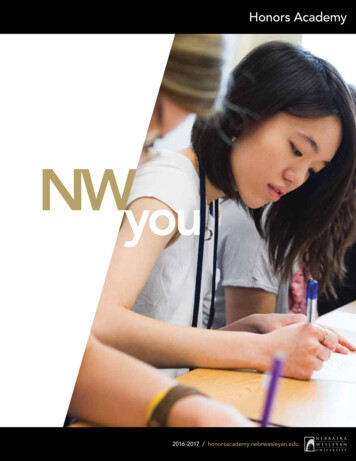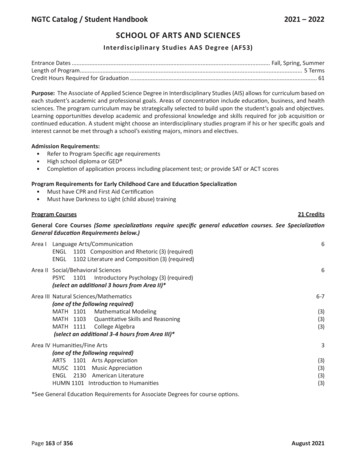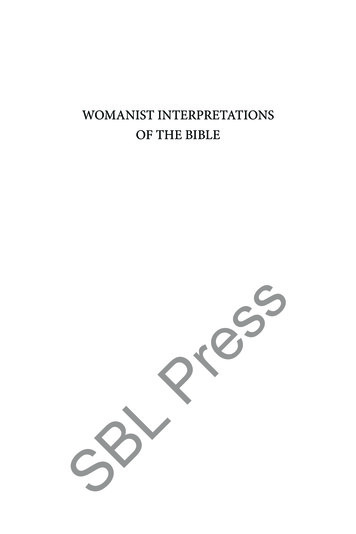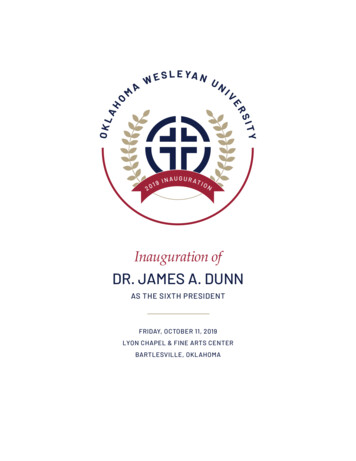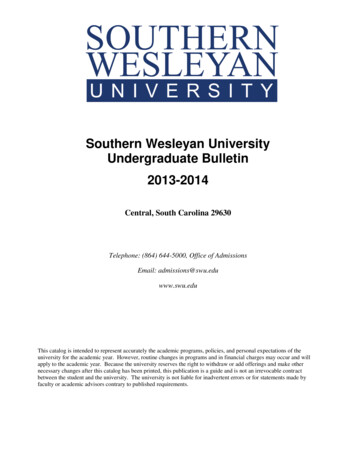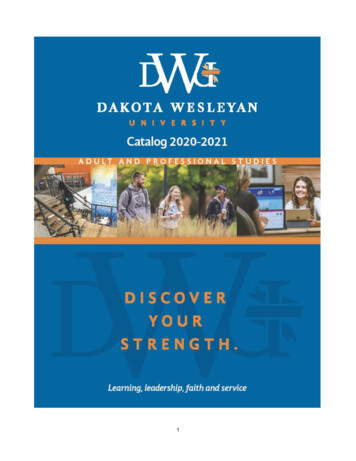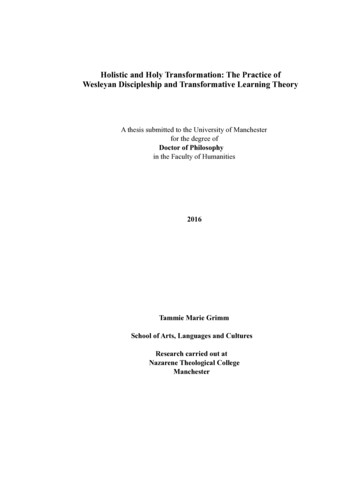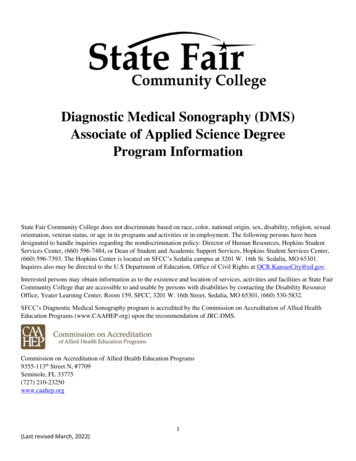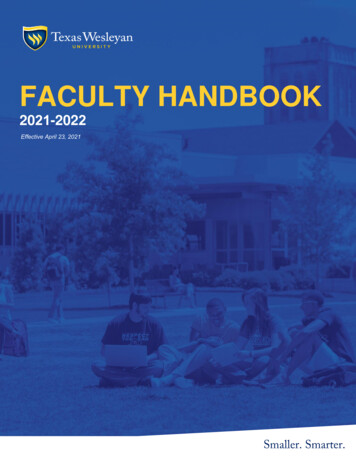
Transcription
History (HIST)HISTORY (HIST)HIST101F History and the Humanities (FYS)This course offers first-year students an opportunity to explore the humanitiesfrom a variety of different disciplinary perspectives, traditionally Western as wellas global, and to make connections between humanistic learning and history.The course is a small discussion seminar in which primary source materials,or classic texts, are used exclusively. An effort will be made to examine theinterrelationship of ideas in the various disciplines and to compare history,literary analysis, philosophy, and theory as modes of inquiry and as ways ofthinking about documents and texts. The course thereby aims to providestudents with the critical tools by which to analyze texts produced in the remoteor recent past. The course also serves a related purpose: to familiarize studentswith the heritage of Western historical tradition and to impart knowledge of thecrucial role of history and the humanities as a component in general education.Students may take HIST101F without having to take HIST102F.Offering: HostGrading: OPTCredits: 1.00Gen Ed Area: HA-HISTPrereq: NoneHIST102F History and the Humanities II (FYS)This course offers first-year students an opportunity to explore the humanitiesfrom a variety of different disciplinary perspectives, traditionally Western as wellas global, and to make connections between humanistic learning and history.The course is a small discussion seminar in which primary source materials,or classic texts, are used exclusively. An effort will be made to examine theinterrelationship of ideas in the various disciplines and to compare history,literary analysis, philosophy, and theory as modes of inquiry and as ways ofthinking about documents and texts. The course thereby aims to providestudents with the critical tools by which to analyze texts produced in the remoteor recent past. The course also serves a related purpose: to familiarize studentswith the heritage of Western historical tradition and to impart knowledge of thecrucial role of history and the humanities as a component in general education.Students may take HIST102F without having taken HIST101F.Offering: HostGrading: OPTCredits: 1.00Gen Ed Area: HA-HISTPrereq: NoneHIST103F From Protest to Revolution: A Middle Eastern History (FYS)This seminar explores protests, rebellions, insurgencies, and revolutionsthat have shaped the history of the Middle East from the birth of the threemonotheistic religions to this day. Why do people rebel? We will seek answersin the context of religion, ethnicity, language, and race in the long and politicalhistory of this wide-ranging human geography. The main focus will be the agencyof those who strived for change and modes of resistance, finishing with the 21stcentury activisms in labor, LGBTQ , student, journalist, academic, and politicalIslamic mobilizations.Offering: HostGrading: OPTCredits: 1.00Gen Ed Area: SBS-HISTPrereq: NoneHIST104F Islam and Empire Through Fiction (FYS)This first-year seminar will cover the three different empires of the Early Modernera (c. 1500-1800), encompassing much of the Muslim world: the OttomanEmpire in the core of the Middle East, Safavid Empire in Persia and beyond, andMughal Empire in South Asia. Our aim is to analyze both common and divergentpatterns and structures of imperial rule as well as shared imperial legacies and1cultural resources. In addition to lectures and secondary background readings,students read and discuss fictional works, with a view to exploring "Islamiccivilization" through literary voices of acclaimed authors. Reading fiction is tohelp us through the fragmentary nature of the sources used to reconstruct themajor debates that surround the emergence and formation of Islamic empires inthe Early Modern period. Questions of fictional narration, historical memory, andrevisionist history will also be discussed.Offering: HostGrading: OPTCredits: 1.00Gen Ed Area: SBS-HISTPrereq: NoneHIST106F Black Reconstruction: The Origins of America's Racial Divide (FYS)Voter intimidation, racial violence, an impeached president, an embattledCongress, threats of a civil war, and emboldened domestic terrorists are nota new phenomenon in American history. All have their roots in America'smost violent, revolutionary, and contested era: Reconstruction. Beginningafter the Civil War, Radical Republicans inside and outside Congress workedwith free Black allies to found an American nation that lived up to its ideals.White domestic terrorists, backed by an increasingly recalcitrant DemocraticParty, violently opposed the increased political power and civil rights of AfricanAmericans. In this first-year seminar, we will examine the contours of thatcontest, the world that it created, and the lasting influence of America'sunfinished revolution.Offering: HostGrading: OPTCredits: 1.00Gen Ed Area: SBS-HISTPrereq: NoneHIST107F Life of the Modern Fact (FYS)Facts aren't born; they are made. The challenge is to understand how peoplehave come to think of facts as existing in the world independent of humanintervention. This course explores the tools and techniques that people haveused to craft facts in varied domains of applied science, such as agriculture,climate modeling, epidemiology, and pharmaceutical production. The coursealso examines how broader social structures, such as law and community,helped produce facts as people shared, defended, and used them. We considerexamples from the 17th century through the present day, including practices ofnature study, classification, quantification, and experiment.Offering: HostGrading: OPTCredits: 1.00Gen Ed Area: SBS-HISTPrereq: NoneHIST109F With Bold Knife and Fork: An Introduction to Food History (FYS)This first-year seminar is an introduction to food history and food studies, twolinked fields in which we ask how people have satisfied their appetites, andwhat their choices mean. This encompasses everything from the question ofhow agriculture began, to the question of what it meant to eat a Korean tacoin Los Angeles in, say, 2014. Food history and food studies are vast fields, andin this seminar we will sample many versions of them. Because this seminar isdesigned for students just beginning college, it introduces a variety of academicapproaches to food, from chronological analyses of how specific ingredientsbecame important for specific populations, to the anthropological treatmentof food and identity, to cultural histories informed by primary sources-that is, documents written by historical actors. We even read contemporary"food writing," including restaurant reviews, which are themselves historicaldocuments of a sort. This course also has a strong chronological throughline, winding from the establishment of agriculture to the modernization andindustrialization of global food ways.Offering: Host
2History (HIST)Grading: OPTCredits: 1.00Gen Ed Area: SBS-HISTPrereq: NoneHIST110F Been in the Storm So Long: Grassroots Movements and the BlackFreedom Struggle (FYS)Most civil rights narratives focus on Martin Luther King, Jr. and other prominentleaders of the civil rights movements. This course seeks to shift that narrative toyoung activists working on the ground in the struggle for Black freedom. Thesecollege students used grassroots organizing tactics, embedding themselvesin local Black communities, to drive local politics and draw attention to largersystemic issues. We will look specifically at the work of the Student NonviolentCoordinating Committee (SNCC), led by John Lewis and Stokely Carmichael, asthey moved from the shock troops of the Southern freedom struggle to BlackPower.Offering: HostGrading: OPTCredits: 1.00Gen Ed Area: SBS-HISTPrereq: NoneHIST116 Environmental History: Telling Stories in PlaceThis course introduces students to environmental history, the study of thechanging relationships between humans and nature through time. We willconsider how the natural world has shaped human history; how humans havetransformed the environments they have moved through, made use of, andinhabited; and how ideas about nature have shaped people's interactions withthe world around them and with one another. Focusing on both historiographyand methods, we will read classic and recent work in the field and learn toconduct historical research. We will also pay attention to narrative and thewriting of history, through reading, in-class workshops, peer editing, and tryingdifferent kinds of historical storytelling. The central assignment will be a shortresearch paper in which students will practice environmental history through thestudy of a particular place.Offering: HostGrading: A-FCredits: 1.00Gen Ed Area: SBS-HISTPrereq: NoneHIST117 Chinese CitiesMore than half of China's population now resides in cities. Within the next fewyears, China plans to accelerate the rate of urbanization by building sprawlingcities and relocating more people into urban areas.This course explores the history of Chinese cities from the imperial to modernage. Cities were centers of commerce, intellectual activity, and, in the words ofhistorian and political scientist David Strand, "storehouses of political technique,strategy, and sentiment open to anyone with the understanding and the willto inventory to exploit them." We will study how cities supported massivepopulations with limited resources, inspired new forms of social organization,and transformed the political and social order of China.Offering: HostGrading: OPTCredits: 1.00Gen Ed Area: SBS-HISTIdentical With: CEAS269Prereq: NoneHIST118F History of U.S Social Movements (FYS)This first year seminar course examines the long history of movements for socialchange in the United States from the 1830s to the 1970s. Movements we willexplore will include abolitionism, women's rights, the black freedom struggle,modern feminism, and gay liberation. We will focus on the tactics used by socialmovements to achieve their goals, how social movements related to each other,how social movements changed over time, and how social movements interactedwith the broader forces of American society, including politics, race, law, andreligion. A major focus of this course will be how historians conduct research, useevidence, and write history. Students will be exposed to primary sources as wellas selected secondary sources in the field.Offering: HostGrading: OPTCredits: 1.00Gen Ed Area: SBS-HISTPrereq: NoneHIST123F Cinema India: South Asia's Past on Film (FYS)This first year seminar course examines the relationship of film and history inIndia. We will focus on how filmmakers represent the past and, alternatively,how films inform historical memory--especially in the context of the competingtrajectories of nationalism, postcolonialism, and globalization. A central concernwill be the historiographical challenges and opportunities of film. We will payparticular attention to Hindi cinema, including films produced by the Bombay/Mumbai ("Bollywood") film industry since the 1950s, though we will alsoconsider the rise of "parallel" cinema. Feature films will range from classicslike "Mughal-e Azam" (1960) and "Umraon Jaan" (1981), to lesser knownworks like "Shatranj ke Khiladi" (1977), "Mirch Masala" (1987), and "HazaaronKhwahishen Aisi" (2005). We will also probe the critical and box-office success ofrelatively recent blockbusters such as "Lagaan" (2001), "Rang de Basanti" (2005),and "Jodhaa Akbar" (2008), comparing them to the ambivalent domestic anddiaspora response to period dramas like "Dil Se" (1998), "Mangal Pandey" (2005)and "Laal Kaptaan" (2019).Offering: HostGrading: OPTCredits: 1.00Gen Ed Area: SBS-HISTPrereq: NoneHIST129 Philosophy and the Movies: The Past on FilmThis course examines how films represent the past and how they can help usunderstand crucial questions in the philosophy of history. We begin with threeweeks on documentary cinema. How do documentary films achieve "the realityeffect"? How has the contemporary documentary's use of reenactment changedour expectations of nonfiction film? Much of the course is devoted to classicnarrative films that help us critically engage questions about the depiction of thepast. We think about those films in relation to texts in this history of philosophyand contemporary film theory.Offering: CrosslistingGrading: OPTCredits: 1.00Gen Ed Area: HA-FILMIdentical With: FILM360, PHIL160Prereq: NoneHIST130F North American Borderlands (FYS)North American Borderlands explores the physical, social, political, cultural,and economic spaces that borders create and purport to divide. The coursecovers a long history and a wide variety of material - with subjects ranging from17th-century contests between Algonquian peoples and Dutch traders alongthe saltwater frontier to the Gilded Age story of a Texas slave who reinventedhimself as a Mexican millionaire, to the sulfur dioxide that blew up from U.S.power plants to fall as acid rain in Canada and sour relations between the twonations in the 1980s. By the end of the course, students will be able to recognizeborderlands as distinctive spaces of conflict, exchange, dispossession, andopportunity.Offering: HostGrading: OPTCredits: 1.00
History (HIST)Gen Ed Area: SBS-HISTPrereq: NoneHIST135 American FoodThis course investigates topics in the history of food production from the colonialperiod to the present, with emphasis on the American contribution to thedevelopment of world food systems and cultures of consumption. Topics to beaddressed include the production of agricultural commodities, development ofnational markets, mass production of food, industrialization of agriculture, andthe recent emergence of organics, slow food, and local movements.Offering: HostGrading: A-FCredits: 1.00Gen Ed Area: SBS-HISTIdentical With: ENVS135Prereq: NoneHIST140 Virtue and Vice in History, Literature, and PhilosophyBeginning with Confucius and Aristotle and reading our way through significanttexts of Christianity, humanism, postmodernism, and critical race theory, we willexplore the ethics, power, and politics intersecting in ideas of virtueOffering: CrosslistingGrading: OPTCredits: 1.00Gen Ed Area: HA-COLIdentical With: COL228, CHUM228, PHIL112Prereq: NoneHIST141 Theories and ModelsThis class will focus on how theories and models are designed and regardedacross the university curriculum--in the humanities, the social sciences, and thesciences. This topic is particularly pertinent to intellectual history, a subject thatregularly uses texts from across the modern university curriculum as its primaryreadings. Given the range of intellectual history, both in terms of chronologyand subject matter, intellectual history could be argued to be the subject bestpositioned to consider the process of making theory.Questions to be addressed include: What are some of the unexpected resultsof the increased use of mathematics and computers even in the humanitiesand social sciences, not just in the sciences, and how has this changed therelationship of theory and models for each of these disciplines? To what extentdoes the debate about the refutability, the falsifiability--or truth status--ofmodels indicate an ongoing need for theory? The specific modern academicsubjects to be examined will be philosophy, economics, and physics. ThomasKuhn's THE STRUCTURE OF SCIENTIFIC REVOLUTIONS (1962) will serve as astarting point for this study; however, most of the readings during the semesterwill be much more recent.Offering: HostGrading: A-FCredits: 1.00Gen Ed Area: SBS-HISTPrereq: NoneHIST151 Introduction to History: The "Russian World" Past and PresentThe "Russian World" has become a central--though deeply ambiguous andcontested--theme in contemporary political discourse both within and beyondRussia. This course will offer a survey of how different conceptions of the"Russian World" have been articulated and deployed over time by following thehistory of Russian lands and peoples from the eighth century to the present day.This course is one of the gateways to the history major and is intended especiallyfor first- and second-year students. As an introduction to history, the coursewill introduce students to the discipline of history by examining the historicalsources, concepts, theories, and methods necessary for reading and writinghistory.Offering: Host3Grading: A-FCredits: 1.00Gen Ed Area: SBS-HISTPrereq: NoneHIST154 Introduction to History: Twelve Medieval PeopleThis course is one of the gateways to the history major. It is also an introductionto the Middle Ages through a study of 12 exemplary medieval lives and minds,spanning a thousand years of history. We focus on people--bodies, minds, andsouls--coping with history and creating sense for their world. The course willtypically feature one person or pair per week, and by examining their writings orstories and the contexts in which these were produced, the nature of medievallife, the pressure on the self, the articulation of gender and ethics for theentire period will come into view. Among the figures studied are likely to beSt. Augustine, Queen Brunhild, St. Anselm, Abelard, Heloise, William Marshal,King Louis IX, Dante, Catherine of Siena, Christine de Pisan, Joan of Arc, MargeryKempe, and Pope Pius II.As an introduction to history course, we will also offer an examination of thebasic concepts, techniques, and skills for reading, understanding, and writinghistory: documents and archives, text and context, sceptical inquiry, argumentconstruction, and an interest in good and expressive writing.Offering: HostGrading: A-FCredits: 1.00Gen Ed Area: SBS-HISTPrereq: NoneHIST156 Introduction to History: The Ottoman WorldThis course treats some of the major themes of Ottoman state and society, oneof the major empires of the world out of which many new polities in the Balkans,Anatolia, the Middle East, and North Africa emerged during the 20th century. Atthe center of the course is the transformation of the so-called classical Ottomanstate to the early modern and modern through the many shapes and forms ithas taken. We will be starting from the 15th century and end with the analysisof the making of the modern Ottoman society by the beginning of the 20thcentury before its imminent collapse. The late 16th-century transformationsand the question of Ottoman "decline," on the one hand, and transformationto a modern state on the other, comprise the historiographical context to beaddressed alongside basic historical patterns and events. A primary concern isto have students engage with critical issues not only in the study of Ottomanhistory, but also situating this history in the discussions on world history ingeneral, and the history of the Middle East in particular.Offering: HostGrading: OPTCredits: 1.00Gen Ed Area: SBS-HISTPrereq: NoneHIST156F Introduction to History: The Ottoman World (FYS)This course treats some of the major themes of Ottoman state and society, oneof the major empires of the world out of which many new polities in the Balkans,Anatolia, the Middle East, and North Africa emerged during the 20th century. Atthe center of the course is the transformation of the so-called classical Ottomanstate to the early modern and modern through the many shapes and forms ithas taken. We will be starting from the 15th century and end with the analysisof the making of the modern Ottoman society by the beginning of the 20thcentury before its imminent collapse. The late 16th-century transformationsand the question of Ottoman "decline," on the one hand, and transformationto a modern state on the other, comprise the historiographical context to beaddressed alongside basic historical patterns and events. A primary concern isto have students engage with critical issues not only in the study of Ottomanhistory, but also situating this history in the discussions on world history ingeneral, and the history of the Middle East in particular.
4History (HIST)Offering: HostGrading: OPTCredits: 1.00Gen Ed Area: SBS-HISTPrereq: NoneHIST170 Introduction to History: American Material CultureThis course introduces students to the study of history through an investigationof American material culture and the built environment from the pre-colonialperiod to the present. The course is structured around Friday site visits inthe New England and mid-Atlantic regions, including the Pequot Museum,Mystic Seaport, Central Park, New York City waterfront, Fresh Kills, and localsuburbs. Students will consider theories and methods of studying history throughobjects, landscapes, and architecture. We will consider how changing patternsof settlement and land use shaped human and natural ecology, and how peoplefashioned cultures and communities through the fabrication, circulation, and useof a wide range of natural and human-made objects.Offering: HostGrading: A-FCredits: 1.00Gen Ed Area: SBS-HISTPrereq: NoneHIST171 Introduction to History: History of U.S. Social MovementsThis Introduction to History course examines the long history of movements forsocial change in the United States from the 1830s to the 1970s. Movements wewill explore will include abolitionism, women's rights, the black freedom struggle,modern feminism, and gay liberation. We will focus on the tactics used by socialmovements to achieve their goals, how social movements related to each other,how social movements changed over time, and how social movements interactedwith the broader forces of American society, including politics, race, law, andreligion. A major focus of this course will be how historians conduct research, useevidence, and write history. Students will be exposed to primary sources as wellas selected secondary sources in the field.Offering: HostGrading: OPTCredits: 1.00Gen Ed Area: SBS-HISTPrereq: NoneHIST172 Introduction to History: Germany from Napoleon to the BerlinRepublicGermany witnessed more dramatic and radical changes in forms of governmentwithin the span of just 31 years (1918-1949) than any other modern society inhistory, yet today it is a model democracy and an anchor of peace and prosperityin the heart of Europe. Germans are credited for extraordinary achievementsin the arts, sciences, and industry, yet they also produced some of history'sdarkest chapters. This introductory course surveys the fascinating and turbulenthistory of modern Germany to analyze the sources of these contradictions.We will begin by locating the birth of modern Germany in the massive socialand political upheavals of the Napoleonic era that set the stage for the riseof German nationalism and rapid industrialization. We will study the unlikelyprocesses that resulted in German unification in 1871 and how Germany'snationalism, growing industrial power, and its deep internal divisions led to apolicy of aggressive imperialism that contributed to the outbreak of the WorldWar I. The course will analyze the profound impact of that war and defeaton German society, situating both the Weimar Republic and the rise of Hitlerin that context. We will subsequently study Nazism, the World War II, andthe Holocaust, as well as the ultimate destruction of Germany as sovereignstate with its surrender and military occupation in 1945. The remainder of thecourse explores the phoenixlike rebirth of two competing German states inthe Cold War and the subsequent parallel development and divergence of twoGerman societies. We will conclude the course by analyzing the process thatled to German reunification in 1990 and the lines of development of the "BerlinRepublic" since that time. The aims of the course are to introduce students tohistorical primary sources, the skills of historical analysis, and the questionsof historiography through a coherent introductory survey of modern Germanhistory.Offering: HostGrading: OPTCredits: 1.00Gen Ed Area: SBS-HISTIdentical With: GRST272Prereq: NoneHIST174 Introduction to History: European ReformationsAn introduction to history course, European Reformations will provide anintroduction to the concepts and tools for reading, writing, and enjoyinghistory by examining the ideas and people who developed the ProtestantReformation, one of the most explosive changes in world history that continuesto reverberate and affect lives and politics today. Centering on the ideas andpolitics of the European Reformation age, we will examine thinkers and problemswithin Catholic Europe that led to the crisis of the Reformation from around1500. A focus on the ideas and actions of figures such as Luther and Calvinand the religious martyrs of the 16th century will be central, but we will alsoexamine Catholic responses and the changing political and legal ideas that theReformation produced.Offering: HostGrading: OPTCredits: 1.00Gen Ed Area: SBS-HISTPrereq: NoneHIST175 Intro to History: Resistance and Revolution in the Atlantic World,1500-1850The Atlantic Ocean created and destroyed empires. This course will explorethose who fought against the expansion of imperial powers, including slaveswho crossed the ocean involuntarily, Indigenous peoples defending theirhomelands, women who demanded equality, and pirates who constructed analternative universe. The Atlantic revolutions (American, French, Haitian, andSouth American) set empires on fire and ushered in a new era of resistance tooppression.Offering: HostGrading: A-FCredits: 1.00Gen Ed Area: SBS-HISTPrereq: NoneHIST176 Introduction to History: Science in the Making: Thinking HistoricallyAbout ScienceThis course introduces students to a range of perspectives--drawn from history,sociology, anthropology, geography, media studies, and literary studies,among others--on how to write about the history of science. Throughout,the emphasis is on understanding the relationship between the historiesof science we can tell and the materials that our histories draw upon, frompublications and archival documents to oral histories, material culture, and film.In addition to reading academic literature, students will gain practical experienceworking with historical sources and conducting original research. They will alsofamiliarize themselves with new digital tools for presenting historical materialsby developing a course website that showcases their research projects.Offering: HostGrading: A-FCredits: 1.00Gen Ed Area: SBS-HISTIdentical With: SISP276Prereq: None
History (HIST)HIST177 Introduction to History: Ireland's Troubled PastIreland's history has been contested by its historians since the start of the 18thcentury. Was it a colony under the brutal occupation of a foreign power, itsneighbor England; or was it an integral part of the United Kingdom with therights and benefits of the other parts of the realm? The differences in how theisland's past was viewed by its inhabitants would contribute to Ireland's partitionin 1923 and the ongoing violence in Northern Ireland that lasted until 1999. Thiscourse will examine various sorts of primary historical sources from governmentdocuments produced by the island's elites to the song lyrics and oral historypreserved by the island's people to understand their past. Lastly, we will examinethe attempt by Irish historians from both sides of the political divide to producehistorical narratives to unite rather than divide the peoples of Ireland.Offering: HostGrading: A-FCredits: 1.00Gen Ed Area: SBS-HISTPrereq: NoneHIST180 Introduction to Japanese History: A Manga Artist's Life in 20th-CenturyJapanThis course uses the four-volume autobiographical manga of Mizuki Shigeru(1922-2015) entitled "Showa: A History of Japan" both to survey most of 20thcentury Japanese history and to introduce some basic concepts and methodsof historical inquiry. Mizuki is most famous for manga that depict supernaturalfigures--yokai--based on Japanese folk tales. One, "GeGeGe no Kitaro," became awildly popular animated series (check it out on YouTube). We will use that fourvolume series, together with various primary sources and other materials, totrack the trajectory of 20th-century Japan from democracy to militarism back todemocracy again in the lives of ordinary Japanese people.Offering: HostGrading: OPTCredits: 1.00Gen Ed Area: SBS-HISTIdentical With: CEAS185Prereq: NoneHIST186 The Raj: India and Britain (Introduction to History)This course examines the linked history of India and Britain from the 18th to the20th century. The focus will be on the rise and demise of the British Empire inSouth Asia, commonly referred to as "the Raj," and how the experience shapedwhat it meant to be both Indian and British. Along the way we will learn howmerchants from a remote island nation in western Europe managed to takecontrol of the wealth and manpower of the Indian subcontinent; how Indianshelped to build the Raj but gradually turned against it; and how in rebellingagainst the Raj, and reshaping it, Indians crafted new forms of social protest andpolitical belonging.This is an Introduction to History course intended mainly for first- and secondyear students who are interested in the past and, perhaps, are even (though notnecessarily) contemplating the history major. As such, it will introduce studentsto the discipline by reflecting on the nature of historical evidence, how to use anarchive, and how to craft a historical argument.Offering: HostGrading: A-FCredits: 1.00Gen Ed Area: SBS-HISTPrereq: NoneHIST188 Introduction to History: Revolutionary Women"I do not think the war would have been won without the women. Nowwomen have to liberate themselves." The fighter Maudy Muzenda's reflectionon the role of women in Zimbabwe's liberation war speaks to a broader patternin global history. Women have been central to the radical transformation ofsocieties in Africa, Asia, Europe, and the Americas from the early modern era5to the present. In this course we will examine revolutionary women who tookup arms and others who protested for improved working conditions, votingrights, sexual liberty, and human rights. Our cases will include the history ofpolitical revolutions in France, Cuba, Russia,
HIST109F With Bold Knife and Fork: An Introduction to Food History (FYS) This first-year seminar is an introduction to food history and food studies, two linked fields in which we ask how people have satisfied their appetites, and what their choic
